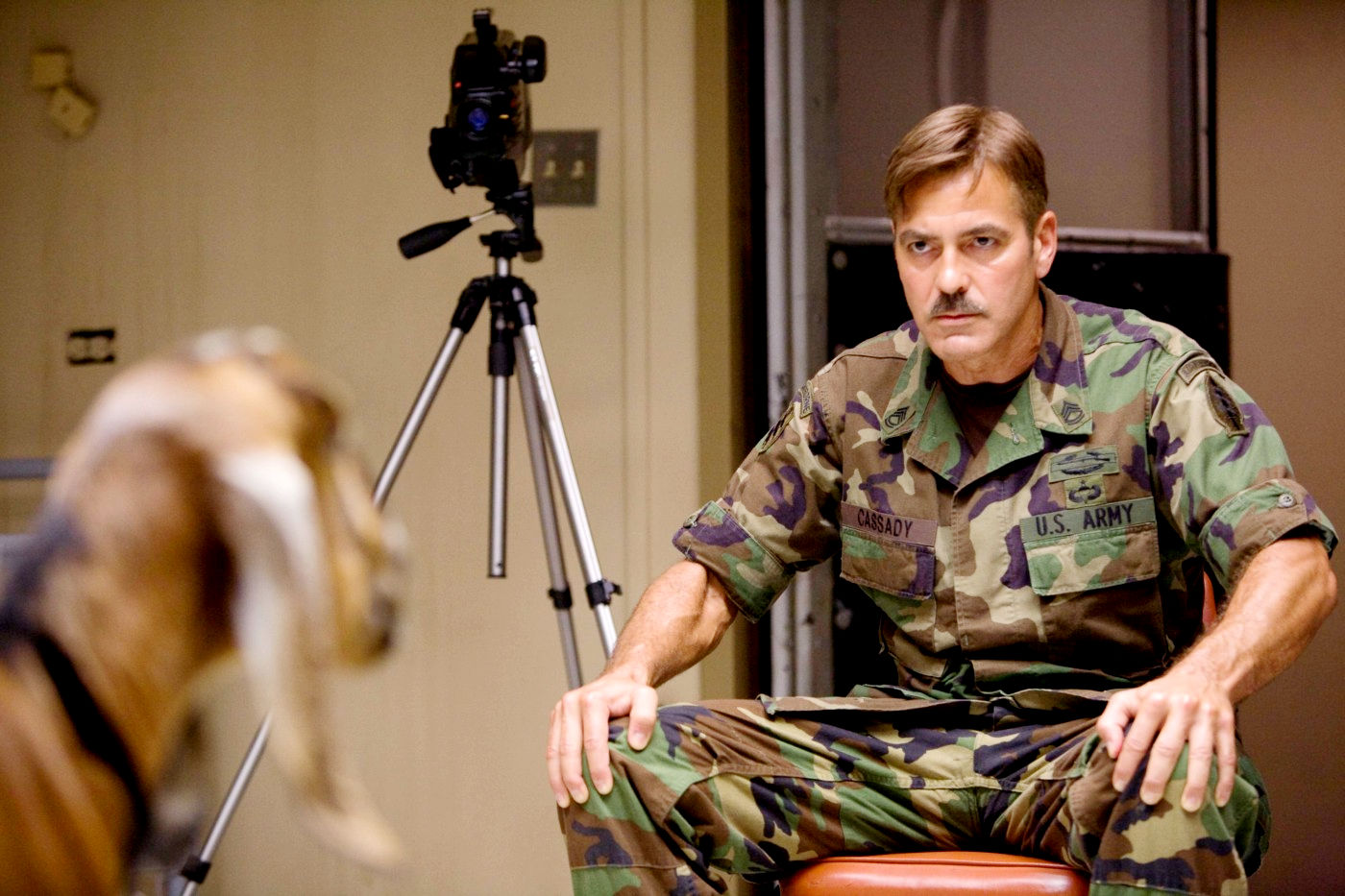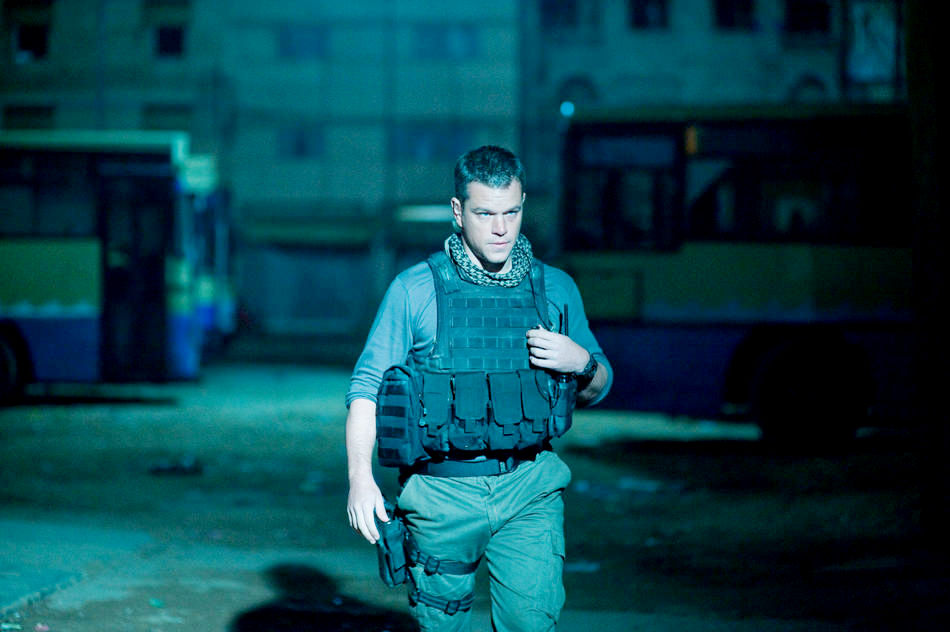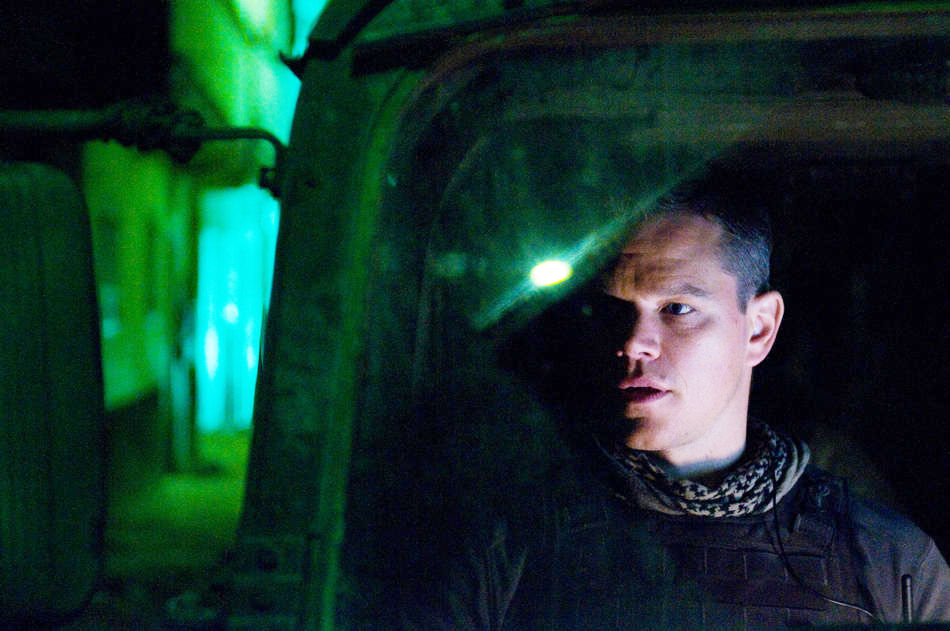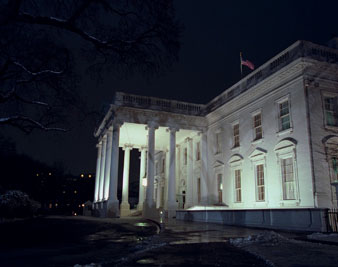
Less a scathing
Catch-22-type satire than it is just a jaunty road movie-type yarn,
Grant Heslov’s The Men Who Stare at Goats, which I caught last weekend, is basically a Coen-lite cinematic bon-bon for the fanboy-inclined. It’s never really laugh-out-loud funny, and something much more dark, resonant, and Strangelovian could (
and probably should) have been made from this choice material, particularly as the story moves into Iraq mode. After all, this is basically the true story of how we, the United States of America, ended up
torturing people with Barney the Dinosaur.
But however frothy about its subject at times, The Men Who Stare at Goats manages to sustain a low-key whimsy and amiable weirdness for most of its run. If anything it feels a bit like the much-maligned and underrated Ocean’s 12: a bunch of exceedingly likable actors — George Clooney, Ewan MacGregor, Jeff Bridges, Kevin Spacey, Stephen Root, Stephen Lang, Robert Patrick — all enjoying an extended goof. Consider it the Road to Iraq, Hope and Crosby-style. David Crosby, that is.
Loosely based on the book by British journalist Jon Ronson, The Men Who Stares at Goats begins with an ambiguous disclaimer (“More of this is true than you would believe“), a Kitty Pryde-experiment gone awry, and a voiceover by one Bob Wilton (MacGregor), a down-on-his-luck reporter for the Ann Arbor Daily-Telegram. (Wilton, unlike Ronson, is an American, although MacGregor’s scattershot accent may make you wonder. Ewan’s a fine actor, but, lordy, he can’t get the Yankee patter down to save his life — yes, it’s worse than Peter Sarsgaard’s British accent, although it’s still better than Don Cheadle’s cockney.)
Anyway, after a chance interview with a psychic hamster-killer (Root) and a falling-out with his cuckolding wife and their mutual boss, Bob alights to Iraq, where he presumes he’ll learn how to impress his now-ex with grim tales of life as a veteran war correspondent. But unfortunately, he can’t even get into the country…until he happens upon Lyn Cassady (Clooney). Disguised as your run-of-the-mill private contractor, Cassady in fact turns out to be a psychic spy, a master of the “sparkly eyes,” a, as he puts it, “Jedi warrior.” (To which MacGregor consistently responds, “Jedi?,” with an arched eyebrow. Like, who in their right mind would spend years doing that?)
Cassady, it turns out, was trained in the psychic arts by his very own Qui-Gon, Bill Django (Bridges). A Vietnam veteran who discovered his own psychic powers through a rigorous regimen of Hippie indulgence, Django managed to convince the Pentagon powers-that-be back in the day that the Age of Aquarius would soon eclipse the Atomic Age on the battlefield — we’re talking peace warriors, psychic samurai, astral projectors, the awesomely unstoppable power of good vibes, brah, you know? (Put simply: “This aggression will not stand, man.”)
Some of the brass (mainly Lang) become fervent believers in Django’s New Age warfare. Others figure, heck, if there is something to this paranormal business, we’d really hate to be on the wrong side of the ball when the psychic shooting starts — Let’s throw some money at it just in case the Russkies are reading our minds right now. And so the First Earth Battalion is born. (And, yes, it really was born — your tax dollars at work.) But, of course, problems emerge — Not all the recruits have Django and Cassady’s intrinsic shamanic gifts. And once the Jedi are founded, there is naturally a Sith waiting in the wings…and, he (Spacey) has no compunction about using the team’s psychic powers for evil. Ya fook one goat…
The rest of the story involves Wilton and Cassady having crazy misadventures in Iraq, while Lyn fills us in on the rise and fall of the First Earth order…which may or may not be gone for good. (After all, someone’s gotta put the psy- in psy-ops.) I presume much of the Iraq narrative was added by Heslov, and sometimes it’s a bit hit-or-miss, frankly. There are brief encounters with Iraqi bounty hunters, ne’er-do-well Blackwater types, and even the infamous Barney-fueled detention chambers, but the tone is too breezy to sustain any kind of edgy or cutting critique of this stuff — It’s more like Syriana on nitrous oxide. (There’s also a sequence involving a LSD-crazed soldier shooting up his army base, which feels more uncomfortable than probably intended, coming right after the tragedy at Ft. Hood.)
Still, while Syriana, or Three Kings, for that matter, — My, Clooney has done a lot of tours in the region now — offers more in the way of food for thought, The Men Who Stare at Goats has its own low-key charms. As I said, the actors are all top-notch and clearly having fun with this project. It’s always good to see the Dude again, even in passing. And the script is relentlessly witty, with wry jokes that slowly creep up on you like a psychic ninja — For example, Spacey talking about the power of subliminal messages, then being distracted by Twizzlers. Mmm, Twizzlers.
Speaking of subliminal messages, I’ve had Boston’s “More than a Feeling” stuck in my head for over a week now thanks to this movie, and I really can’t stand Boston. So, well-played, Jedi, well-played.






